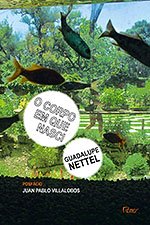El cuerpo en que nací
Guadalupe Nettel
NOVEL | 2011 | 200 pages
Inspired by the author’s own childhood, El cuerpo en que nací is the story of a girl born with a birth defect in her eye. Her life, during the 1970s, is marked by her poor vision but also by the dominant ideology of the times: her parents’ open marriage, her militant teachers, hippy communes, sexual freedom and its consequences. Her physical and psychological idiosyncrasies cause her to see the people who live on margins of society and the edge of social conventions as her kindred spirits. Written as a soliloquy from a psychoanalyst’s chaise lounge, the narrator reveals her most intimate secrets and the meaning that she gives to her own existence.
This is a story full of humor, but also of realism, in which the world of childhood is much more ominous than it seems at first sight. A novel about the journey to adulthood and the discovery of literature, a bildungsroman that takes place between Latin America and Europe and which avoids cliché. South American exile, North African migration and the prisons of Mexico City are the context for this moving novel, which traces apersonal journey towards dignity and self-acceptance. With her new novel Guadalupe Nettel confirms something that the critics have been celebrating since her literary debut: that she is one of the most important voices in Spanish language writing of the last decade.
RIGHTS: spanish EDITORIAL ANAGRAMA | english (usa) SEVEN STORIES PRESS | italian LA NUOVA FRONTIERA | french ACTES SUD | norwegian SOLUM FORLAG | danish GRIF | turkish NEBULA KITAP
“It’s a book that, in under 200 pages, manages to raise and resolve three impeccable objectives: first, telling a story of initiation and learning; second, expressing how a literary vision is built; and third, writing a tale with a moving moral focus, that of a woman who reveals her doubts as she educates her children and remembers how she was educated in the past. A book in the style of my own work and similar to novels published this year by Patricio Pron and Alejandro Zambra.”
“One of the fascinating qualities of this book is the unsparing testimony, somewhere between religious confession and secular disclosure, that gives a sharp sense of a woman’s harrowing girlhood. Nettel’s candid, unaffected prose hews closely to the strictures of the therapy session. (...) Nettel’s strategy yields rich rewards. Concealing the adult narrator disturbs the distance between reader and author; the intimacy forces the reader into the girl’s vulnerable body. This vivid image of the ardent girl as revealed by a faceless woman hints at the tangled snare of the past.”
“With straightforward, honest prose, Nettel paints a vivid portrait of a girl always just on the edge of community and illustrates the beauty and strength of a mind shaped by hardship. She perfectly captures the awkwardness and insecurities of growing up and the small, strange moments that change us forever.”
“Nettel’s eye lightly deforms things and gives rise to a tension, subtle but persistent, that immerses us in an uncomfortable reality, disquieting, even disturbing—a gaze that illuminates her prose like an alien sun shining down on our world.”
“The Body Where I Was Born infuses the reader with an intimate portrait of the astute and wondrous depth that children use to observe and makes sense of humanity. The language in the book is poetic yet accessible, and at certain points Nettel hits you with a sentence so brilliant and poignant that you have to read it another time in order to fully indulge the narrator’s oral recollection of who she was. This book is fierce and from the gut. It is a testimony of a woman finding agency in her body because it is physical evidence that connects her to the planet and the rest of humanity.”
“Nettel has brilliantly found a form to contain the multitudes of what one body can hold.”
BY GUADALUPE NETTEL:
Los divagantes
STORIES, 2023
La hija única
NOVEL, 2020
Después del invierno
NOVEL, 2014
El matrimonio de los peces rojos
STORIES, 2013
El cuerpo en que nací
NOVEL, 2011
Pétalos y otras historias incómodas
STORIES, 2008
El huésped
NOVEL, 2006







